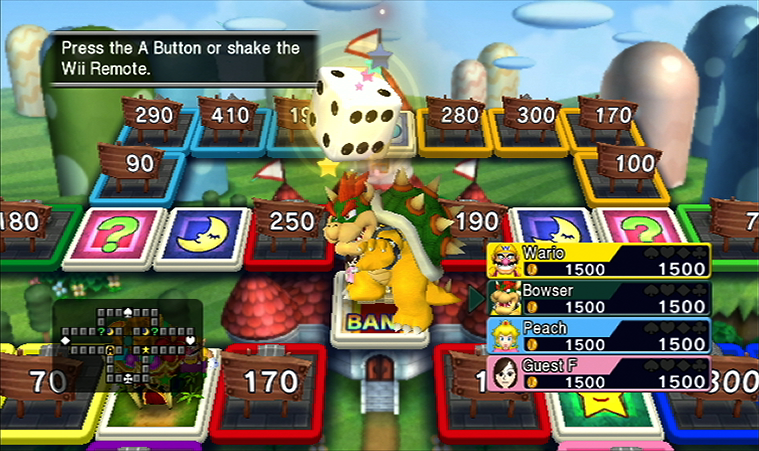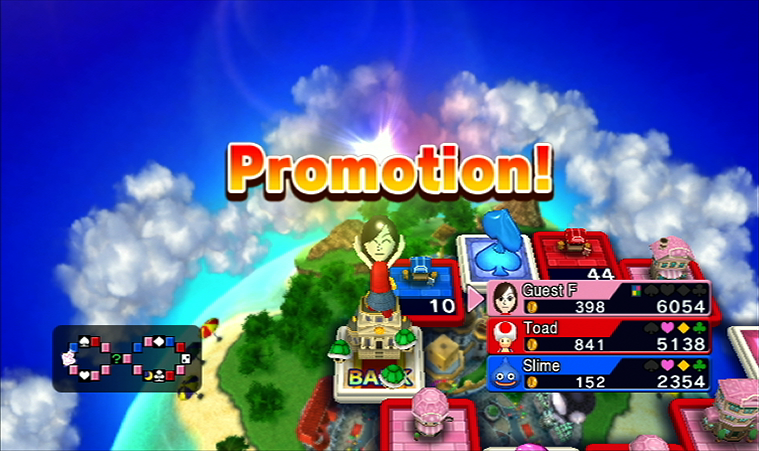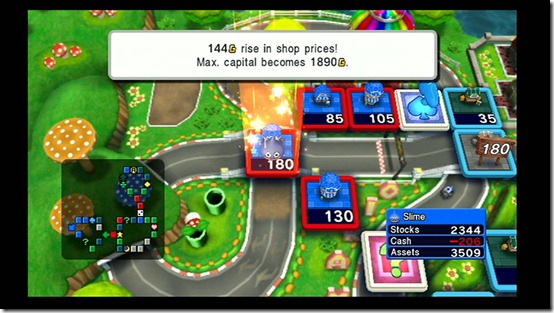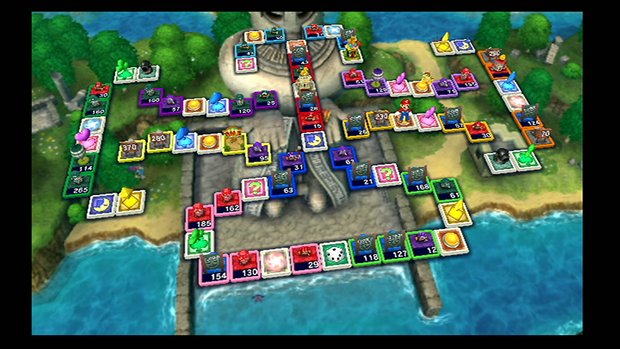I want to tell you something about Fortune Street. Fortune Street says it’s ok to want money and to desire funds to make more money. Also, it inspires you to screw over your family members and/or friends by turning into a capitalist pig. It’s interesting playing the game with a Certified Public Accountant (CPA) and a Political Science PhD/ Economics MA. How exactly did the guy with a Theology MTS win a game? Certainly he shouldn’t try to play a Monopoly and/or stock trading hybrid and love it, right?
Let’s get one thing out of the way: video games, and especially ones based on board games, use real-world concepts, those both fun and not fun, to make them more fun. It’s a video game, and video games requires challenge, difficulty, and interesting mechanics. Fortune Street successfully translates the world of stock trading and property ownership/flipping into a simplified board game version for four players.
The Bible certainly tells us much of the misuse of money, surely, as in Matthew 6:24
24 “No one can serve two masters; for either he will hate the one and love the other, or he will be devoted to one and despise the other. You cannot serve God and wealth.
and 1 Timothy 6:10 gives us yet another one, and we could do this all day:
For the love of money is a root of all kinds of evil. Some people, eager for money, have wandered from the faith and pierced themselves with many griefs.
Yet, we also have the example of Solomon, one of the wealthiest people in the whole world by virtue of not wanting money but wisdom.
10 It was pleasing in the sight of the Lord that Solomon had asked this thing. 11 God said to him, “Because you have asked this thing and have not asked for yourself long life, nor have asked riches for yourself, nor have you asked for the life of your enemies, but have asked for yourself discernment to understand justice, 12 behold, I have done according to your words. Behold, I have given you a wise and discerning heart, so that there has been no one like you before you, nor shall one like you arise after you. 13 I have also given you what you have not asked, both riches and honor, so that there will not be any among the kings like you all your days. 14 If you walk in My ways, keeping My statutes and commandments, as your father David walked, then I will prolong your days.”
1 Kings 3
Then, it’s not necessarily about money. The abuse of money, the placing of such objects as an idol in place of God, is the problem. And a mighty difficult problem it remains! The love of money will take you down, but the use of money as a tool will do great things.
In any event, I am not so concerned with the trappings of a game’s shell and more about what the game teaches you. In this case, the lessons appear like heartless free enterprise (or “capitalism”, more pejoratively). Of course, this neglects how that system, worldwide, cuts the level of extreme poverty in half over a period of twenty-two years, or how this level of wealth increase (caused by, surprise, outsourcing) could possibly pump many former third-world countries into a profitable economic status faster than we could predict, but yeah, money’s all bad. So sarcasm off.

Fortune Street is better known as Itadaki Street in Japan, translated as something equivalent to “thank you, I’ll be taking all that money now” with a sense of smug satisfaction). Dragon Quest’s Yuji Horii originally placed the idea of a property-swapping, stock trading minigame into Dragon Quest III. Yes, the NES one; Japanese people had far different tastes than us Westerners, and still do. This small portion of the overall experience became so popular that in 1991 Enix turned it into its own series, and it has continued to evolve to this day and to this, the first English-language release.
I wouldn’t say the packaging surrounding this magnificent game of strategy and chance will necessarily help in any way but by being a gateway drug for the uninitiated. If you like Mario or Dragon Quest characters, game boards, and theming, then this might attract you. In the end, though, the aesthetic give way to the complications of a 4-player board game with complicated stock trades (thus justifying, through large calculations, its existence as a video game).
At its simplest, Fortune Street looks, sounds, and feels like a peppy and bright game of Parker Brothers’ Monopoly. On the game’s Easy ruleset, it’s almost identical save for the lack of specific colored regions. There’s properties, you buy them, build them up, and if people land on them they pay you cash by force. You still pass Go in the form of card suits (pass by all four of them on the board) and then passing by the Bank, which gets you a promotion based on your overall worth and a raise for further investment. You still roll a die, and sometimes Chance and Community Chest (here in the form of uncontrolled mini-games and picking Venture cards) help you out. Sounds simple enough, right?

Normal Mode, which I recommend you play from the outset, throws much of the same strategies used in Monopoly to the curb. Unlike Monopoly, the goal isn’t to, well, get a monopoly on the real estate game. Rather, it’s a race to reach a certain cash amount before your opponent. Fortune Street’s version of an investment goes further than Monopoly in the form of stocks. Each game board separates into a variety of colored districts. Investing in properties there will raise the price of all other properties in the district. As well, owning properties within the same district will also increase their value. All of these actions also increase the price of stocks in that district, the initial stock prices there determined by the (randomized) value of the properties within that district.
So, on your first few turns, you’ll want to pick up as many properties as possible. Fortune Street starts every player with a sizable amount of ready cash – enough to buy several properties, but not enough to buy them all. The dice rolls (between 1-6 or 1-8, depending on the map size) determine the initial board layout between the players, and it is quite random. Getting promotions remains the best strategy in the early game, as fetching funds for property buying remains a top priority.
After the first few rings around the board, the divergence from Parker Brothers’ classic become apparent. Passing by the Bank, which you will need to get said promotions and extra ready cash, will also provide you the ability to purchase stock. More than likely, your first stock investment will be an educated guess depending on player behavior and personality. If somebody has two properties in one district, they can invest more capital in their shops to increase their value and the amount of money that one must pay if you land on them.
In that case, the obvious answer is that investing in a district where you own multiple properties will advance you more than a district where everyone owns one property (note: districts can contain more than four properties). Here lies the tipping point, though: a player can buy stock in any district, even those in which he/she has no property whatsoever. This completely changes the dynamic of the game.
Suppose I buy stocks in a district, say, 99 right at the start of the game in a district where someone owns multiple properties. I don’t happen to pick up many properties as my opponents, but the district to which I invested ends up raising its stock price tenfold over the course of the game due to one person owning a large number of the properties there. If he/she invests capital in that district, the stock price will rise. If it started at 10g (it’s in gold here) per stock, I invested approximately 990g at the start of the game, which translates to 9900 in net worth increase over the length of the game, a huge return on a relatively little investment. This doesn’t even require owning properties; you can piggyback on the investments and movements of other players at every turn, provided you make enough educated guesses and invest wisely.
That investment also means, relative to the number of stocks you own, that you obtain a dividend based on every transaction that happens within that district (say, a person lands on a space and you get 20%, depends on the stock price). Since the game considers you net worth (the combined total of all your assets, stocks included) into the “money total”, then you can see how this gets complicated. You must diversify, hedge and leverage your assets, and figure out how to obtain the most net worth without losing any yourself. Everyone tends to end up with fingers in each other’s pies, and the race to the finish become quite close due to the mixed nature of one’s investments. Mutual benefit often comes into play, and abusing that relationship contributes to the game’s strategic sense.
Players can buy lots of property and invest, certainly, but they also find other people making money off of their investments too. Probably one of the optimal strategies consists in selling exactly ten stock you currently own in an opponent’s district over a period of time, decreasing the stock price on their property while getting your money out of their district at an optimal price. You can do this as many times as you want in a turn, meaning you can truly put the hurt on your opponents if you own enough stock in their district to make a difference. This works especially well once you’ve pumped the stock price high enough to make a huge profit, then cementing your lead and destroying your friends. Thus, everyone’s financial well-being ties together into a grand and messy cacophony of numbers going up whenever just about anything happens.
It reminds me of the Dotcom bubbles of the early nineties, wherein every trader and their mother invested in the rapidly increasing number of Internet-based companies. As in Fortune Street, many people invested in something that had huge potential (as in a dominated district, when one person owns all the properties in it). However, once the capital and innovation dry up, people pull out immediately, thus landing that once great investment high and dry.
Of course, in Fortune Street, there’s a further complication: board manipulation. Suppose you own several districts ripe for development. You can always just wait it out, and let the board’s random chance dice rolls take out people’s money before investing. I’ll let you in on my strategy: I owned a huge set of lots on the right side of the Mario Circuit board. Everyone invested into it, assuming that I would develop it immediately. Seeing this, I simply refused to do anything that would raise the stock price, preferring to buy 9 stocks per Bank visit. When they eventually ran out of funds and had to sell their stock, I swooped into the opportunity like a bird of prey. Using a boatload of ready cash stockpiled from the lack of investment during the game’s protracted period (caused by me, of course) and multiple promotions for myself, I immediately bought 99 stock, landed on my properties (required to invest on your shops), and pumped them to full capital. Once the investments capped out, leaving me with a 40g stock price increase, I immediately sold out and made a fortune. Perfect timing and planning went into it, and I ended up the winner by about 4000g – a substantial lead in a game with mutual investment opportunity.

In short, Fortune Street contains a unbelievable strategic depth that I have not experienced for quite a while. The systems tend to combine in ways that make for close games or excellent strategies working out. The randomness of certain rewards, however, can level the playing field (such as warps, teleports, shop price/stock price increase/decrease, and various other effects). Often, the shifting nature of the board, the ability to buyout other people’s properties forcefully, and the constant deals people can make to exchange properties can really change the dynamics in an instant. Truly, you’ll need to adjust on the fly and figure out their plans before you fall behind. Trust me, the game accelerates during the latter part, and failing to hit the money train will lead to a loss. Different board layouts (18 in the Wii game) change the strategies even further, with larger boards meaning more money, but also more chances for failure. Bigger is, indeed, better.
Of course, I could complain about how the AI cheats, or that the “single player experience” isn’t all that engaging. But, if you were buying the game with these things in mind, you don’t know what you want out of a video games board game (that makes sense). Get three people over your house, or play online – that’st the only way to truly get Fortune Street.
Intended Audience: Truly, there’s not a single objectionable thing within the whole game, save your attitude towards the arbitrary trappings of making money in a cutthroat way in a board game. Young children may also find the lack of action distasteful, but it’s certainly an all-ages affair provided everyone wants to play, especially Easy Mode.

